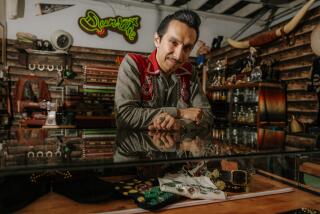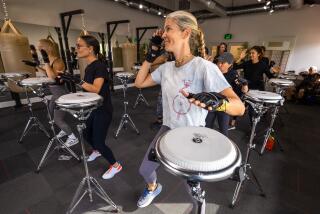Firm Marches to the Beat of the Discriminating Drummer : Music: Trueline’s patented grip snares musicians who prefer the company’s drumsticks.
- Share via
Dan Frank hates it when someone asks him what he does for a living.
“I make drumsticks,” says Frank, the 31-year-old co-owner of Trueline Drumstick Co. in the Loma Portal area.
“And then I get these responses like, ‘What do you do with the rest of the chicken?’ or ‘Oh, I love ice cream,’ ” said Frank, who then explains, once again, that his company makes wooden sticks for musicians.
Frank and his partner, Lalo Barcelo, produce about 30,000 pairs of drumsticks a year, a tiny number compared with the millions that big businesses in the industry can churn out.
But Trueline drumsticks are better, Frank claims, because they have a patented grip and undergo a thorough inspection before they’re sold.
“You’ve got some drummers out there who will pick up any kind of a stick and play, and it won’t make a difference to them,” said Frank, who has been playing for 22 years. But music is usually such a personal business that most drummers will have some preference about what kind of stick they use, he said.
Trueline customers usually are seasoned drummers who are picky about what kind of sticks they use, Frank said. Advertising has been limited to two trade magazines, and the company relies on its endorsers and users to spread the word.
Even the Trueline ad is understated. It displays a hand holding a Trueline drumstick and reads, “For the discriminating drummer.”
“The grip is our claim to fame,” Frank said. “Most people know it as ‘the stick with the bump on it.’ ”
Trueline makes traditional, straight wooden drumsticks, but its specialty is Barcelo’s invention, which is a fattened area on the stick that fits into the drummer’s palm. The special grip allows a player to hold the stick with less energy, which allows the drummer to concentrate on performance, Frank said. “I can play with more volume, more power.”
Barcelo, 41, who patented the design in 1982, said he came up with the idea of a special grip while playing in a Mexican band in the 1970s.
He has been playing for 23 years and still does five gigs a week at the San Diego Marriott Hotel and Marina, said he found that traditional drumsticks did not provide a good enough grip.
“I would put tape on the end of them, and that worked fine as long as the tape was fresh,” Barcelo said.
One day while visiting his construction worker father in Tijuana, Barcelo asked him if he knew how drumsticks were made. His father took a lath--a thin strip of wood--and a knife, and Barcelo learned how to make his own drumstick.
After making several traditional straight sticks, Barcelo decided to experiment a little, and the Trueline grip was born.
But not all drummers are fans.
“I just don’t like the grip,” said drummer John Hernandez of San Diego. “I don’t like the feel of it in my hand.”
He added: “It’s just a personal thing, because I know people who will never use anything but Trueline. . . . It’s basically designed for guys who sweat a lot and their sticks fly out of their hands.”
Trueline drumsticks also are designed for people who are hard on their equipment, Frank said. “I get guys who call me who say they’re going on tour for about two to three months, and they say they need about 100 sticks,” he said. “And I say ‘Fine,’ and I send them two dozen, and I won’t hear from them until they come back.”
According to Frank and Barcelo, the secret is in the quality of the wood. Like other drumstick manufacturers, they use hickory wood, but they are extremely selective about what they use, Frank said. Their hickory is kiln-dried at 375 degrees for about three weeks. Even then, the company throws away about two sticks for each one that it sells, Barcelo said.
The business is small; only Frank, Barcelo and a third worker operate out of a tiny room off an alley; sanding, polishing, stamping and lacquering each stick by hand, Barcelo said.
Frank personally rolls every drumstick “to test for straightness,” he said, and briefly plays each pair to test for pitch and feel.
“I’ve been playing for 22 years. I know what a good stick feels like and what a bad stick feels like,” he said.
But having a drummer do the final inspection isn’t always a great idea from a business standpoint, said Herb Brochstein, president of Houston-based Pro-mark Corp., which is one of the largest drumstick makers in the nation.
Pro-mark makes more than 2 million pairs a year, “and every one of our sticks are examined by a human being,” he said, although most of the inspectors aren’t drummers. “We have one woman who has been doing it for more than 10 years, and she doesn’t play. She doesn’t get emotionally involved with the diameter and the feel and all that,” Brochstein said.
Frank said he and Barcelo aim to become indispensable to enough people so they can raise their prices above the $9 a pair they charge--the standard price for drumsticks.
Although the company has been in business since 1981, it’s still not profitable, and both men work full-time night jobs to make ends meet.
In a few years, Frank hopes to quit his job as a waiter at the Hungry Hunter. And Barcelo would like to end his gigs at the Marriott.
“But,” added Frank, “I don’t want to go past the craft stage. I never want to lose touch with rolling every stick and playing them, even when we start making money.”
More to Read
The biggest entertainment stories
Get our big stories about Hollywood, film, television, music, arts, culture and more right in your inbox as soon as they publish.
You may occasionally receive promotional content from the Los Angeles Times.










